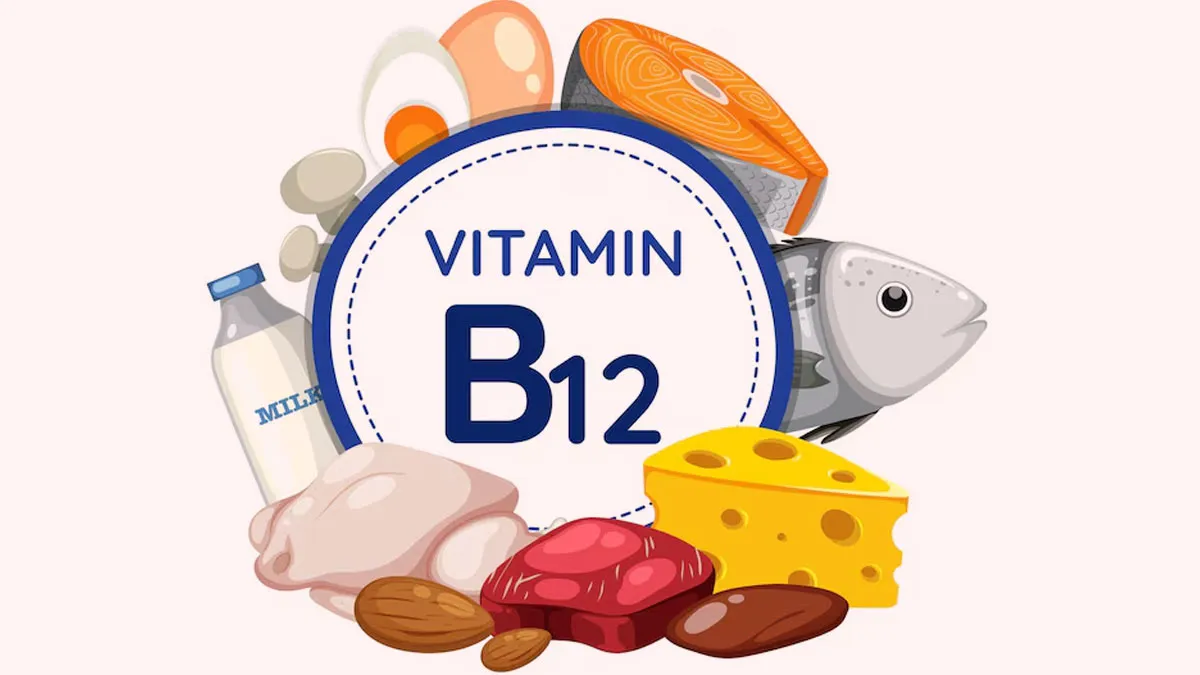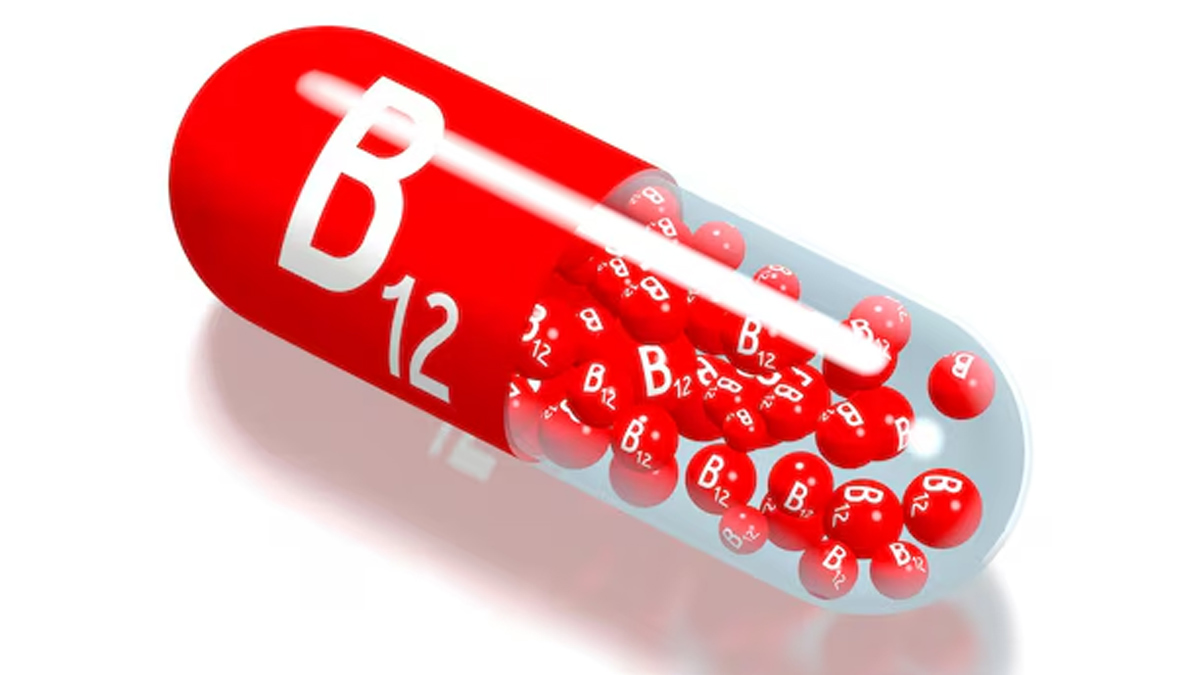
Vitamin B12 is an essential nutrient that plays a crucial role in nerve function, red blood cell formation, and DNA synthesis. Despite its importance, many people suffer from B12 deficiency due to poor absorption rather than inadequate intake. Ensuring your body effectively absorbs this vitamin is key to maintaining good health.
Table of Content:-
To gain expert insights into optimising B12 absorption, we spoke to Dr N Sai Samhita, MBBS, General Physician and Telemedicine Consultant, Hyderabad, who explained the factors that influence B12 uptake and how to enhance it.
The Absorption Pathway
Vitamin B12 absorption is a complex process that involves multiple steps in the digestive system. If any of these steps are disrupted, it can lead to deficiency.

Gastric Release:
According to Dr Samhita, "B12 must first be liberated from food proteins by stomach acid and pepsin. Inadequate stomach acid production, common in older adults and those taking acid-reducing medications, can impair this initial step."
Intrinsic Factor Binding:
"The freed B12 then binds to an intrinsic factor, a glycoprotein secreted by gastric parietal cells. This binding is essential for absorption in the intestine," explains Dr Samhita.
Ileal Absorption:
"The B12-intrinsic factor complex is absorbed specifically in the terminal ileum. Conditions affecting this region, such as Crohn's disease or surgical resection, significantly impair absorption," she adds.
Since vitamin B12 is primarily found in animal-based foods, those following vegetarian or vegan diets are also at a higher risk of deficiency.
Also read: Are You Lacking Vitamin B12? Sore Gums And Other Telltale Symptoms
Strategies to Enhance B12 Absorption
To ensure optimal B12 uptake and utilization, Dr Samhita recommends the following evidence-based approaches:

1. Dietary Considerations
Eat B12-rich foods: The best sources of B12 include meat, fish, dairy, and eggs.
Include fermented foods: Some fermented foods, such as kimchi, tempeh, and yogurt, may support gut health and aid absorption.
2. Address Common Absorption Impediments
Several health conditions and medications can interfere with B12 absorption:
Gastrointestinal Disorders: Conditions like Crohn’s disease, celiac disease, and atrophic gastritis can reduce the body's ability to absorb B12. Managing these conditions properly is essential.
Medications: "Certain medications, such as metformin (for diabetes), proton pump inhibitors (PPIs), and H2 blockers (for acid reflux), can reduce B12 absorption," warns Dr Samhita. "Patients on long-term medication should monitor their B12 levels regularly."
Genetic Factors: Variants in the MTHFR gene can affect B12 metabolism. "Genetic testing can help identify individuals who may need specific forms of B12, such as methylcobalamin," she explains.
Also read: Skin Signs of Vitamin B12 Deficiency: Expert Shares What to Watch For
3. Supplementation Approaches
For those who have difficulty absorbing B12 from food, supplementation is a practical solution:
Sublingual or nasal supplements: "These formulations bypass the digestive system, making them ideal for individuals with malabsorption issues," suggests Dr Samhita.
Injections for severe deficiency: "In cases of pernicious anemia or severe malabsorption, intramuscular B12 injections are necessary," she adds.
Timing matters: "Taking B12 supplements with meals containing protein can enhance absorption in individuals with intact digestive function," Dr Samhita advises.

4. Monitoring B12 Status
Dr Samhita emphasizes the importance of regular monitoring, particularly for those at higher risk of deficiency:
"I advise patients to monitor both clinical symptoms and laboratory values. Beyond standard B12 serum levels, methylmalonic acid (MMA) and homocysteine measurements provide more sensitive indicators of functional B12 status at the cellular level," she says.
Symptoms of deficiency include fatigue, numbness or tingling in the hands and feet, memory problems, and mood changes. If left untreated, deficiency can lead to irreversible nerve damage.
Who Should Be Extra Cautious?
Certain groups of people need to be particularly vigilant about their B12 levels:
- People over 50: Stomach acid production declines with age, making B12 absorption less efficient.
- Vegans and vegetarians: Since B12 is mostly found in animal products, plant-based eaters should take fortified foods or supplements.
- Individuals with digestive disorders: Those with Crohn’s disease, celiac disease, or gastric bypass surgery may struggle to absorb B12 properly.
Conclusion
Ensuring proper B12 absorption is not just about consuming enough of the vitamin but also about optimising digestive health. "For patients over 50, those following plant-based diets, or individuals with digestive disorders, proactive attention to B12 status is particularly important to prevent potentially irreversible neurological complications," concludes Dr N Sai Samhita. If you're experiencing symptoms of deficiency or fall into a high-risk category, consult a doctor to evaluate your B12 levels and choose the best absorption strategy for you.
Also watch this video
Read Next
Why ‘Healthy’ Foods Might Be Giving You Migraines and Rashes, All About Histamine Intolerance
How we keep this article up to date:
We work with experts and keep a close eye on the latest in health and wellness. Whenever there is a new research or helpful information, we update our articles with accurate and useful advice.
Current Version